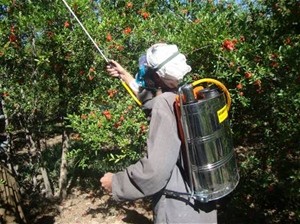
USAID/AVIPA’s insect-fighting spray saves the livelihoods of thousands of Kandahari orchard farmers.
IRD/AVIPA Plus
USAID/AVIPA’s insect-fighting spray saves the livelihoods of thousands of Kandahari orchard farmers.
“AVIPA’s assistance has had a positive effect on local security and stability. Before, farmers grew poppy and there were many drug addicts. Most of the residents were out of work and had to travel to other regions to find employment. Now, they have returned home to work in their own country and in their own villages.” — Abdul Khai, orchard owner, Sarkari Bagh village, Kandahar
5 MAY 2010 | KANDAHAR, AFGHANISTAN
CHALLENGE The famous Kandahari orchards in times of peace boast Kismish and Ayta grapes, apricots, figs, almonds, and the most illustrious of them all – pomegranates, whose succulent fruit has been a long-standing emblem of this region. Orchards are vulnerable to the vicissitudes of war: trees that have taken years or decades to develop may be destroyed in an instant. However, not all enemies of the trees are human: insects can be more dangerous to a tree than a thousand bullets.
In March 2010, Kandahar was overrun by an infestation of aphids: small plant-eating insects that are among the most destructive tree-killing pests in this area. Farmers and shura members approached USAID’s Afghanistan Vouchers for Increased Production in Agriculture (AVIPA) Plus program to seek assistance with the rising aphid blight, which, if left unchecked, would have severely damaged at least one third of Kandahar’s orchards, delivering a severe blow to the livelihoods of thousands of struggling farmers.
INITIATIVE In consultation with the farming community, the Kandahar Directorate of Agriculture, Irrigation and Livestock (DAIL), and the Agricultural Department of Kandahar University, AVIPA Plus developed and started rapidly implementing a complete custom-made Integrated Pest Management (IPM) project. A simple but effective eco-friendly solution of soap and water was prepared and tested, which, when applied properly, also decreases the presence of two other local pests – thrips and whiteflies.
By mid-April, the IPM project was expanded to the orchards around the city of Kandahar and in the districts of Zhari and Panjwayi.
RESULTS To date, 6,000 workers have sprayed 8,500 hectares of the Kandahari orchards since March 2010. The workers are all local villagers, many of whom own and earn a livelihood from the very orchards they are now protecting from the pests.
In addition, AVIPA Plus will train, equip, and supply a DAIL-sponsored hundred-member team to pass on the know-how to local governmental representatives, thus ensuring the sustainability of the initiative.
Under the IPM project, the laborers earn good money and the orchard owners will save their fruit crops this season.
Not all foes are human – obliterating the livelihood of the farmers can be as destructive as the effects of war. USAID/AVIPA Plus continues to work with the farmers of Afghanistan to strengthen their peaceful livelihoods.







Comment
Make a general inquiry or suggest an improvement.